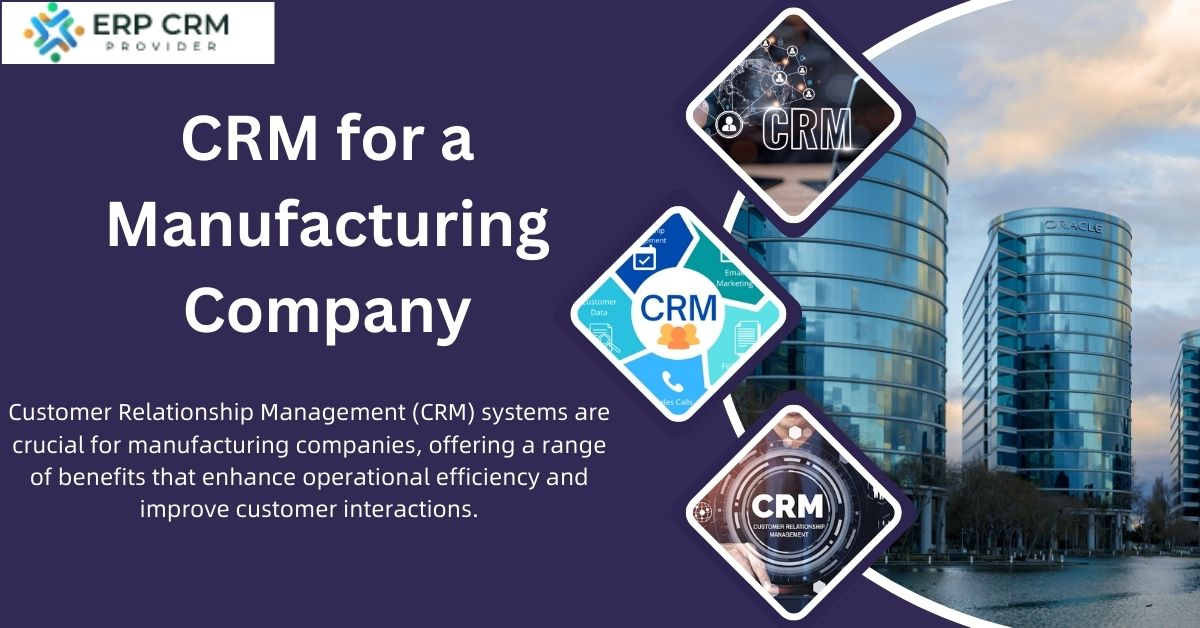Effective customer relationship management (CRM) is essential for success in today’s competitive manufacturing landscape. CRM helps the company empower businesses to enhance customer insights, streamline sales processes, and improve communication across departments. By leveraging this technology, manufacturers can build stronger customer relationships, increase efficiency, and drive growth, positioning themselves for long-term success in an ever-evolving market.
Understanding the Role of CRM in Manufacturing
CRM for a manufacturing company serves as a centralized platform that manages all customer interactions and data throughout the entire lifecycle. This includes everything from lead generation and sales processes to post-sale support. The primary goal is to improve customer satisfaction and drive growth by leveraging customer data effectively.
Key Benefits of CRM for a Manufacturing Company
- Improved Customer insights: A significant advantage of CRM for a company is the enhanced visibility into customer preferences and behaviors. By analyzing data collected from various touchpoints, manufacturers can gain insights that enable them to tailor their products and services to better meet customer needs.
- Streamlined Sales Processes: CRM for a manufacturing company automates many aspects of the sales process, from lead tracking to follow-ups. This automation reduces manual tasks, allowing sales teams to focus on building relationships and closing deals, ultimately leading to higher conversion rates.
- Enhanced Communication and Collaboration: Effective communication is crucial in manufacturing. CRM for a manufacturing company facilitates better collaboration among departments, including sales, production, and customer service. With a shared platform, teams can access real-time information about customer orders and preferences, improving overall service delivery.
- Data-Driven Decision Making : Utilizing analytics features in CRM for a manufacturing company allows manufacturers to make informed decisions based on actual customer data. Understanding market trends and customer preferences helps businesses adjust strategies and enhance performance.
Implementing CRM in Your Manufacturing Company

To fully leverage the benefits of CRM for a manufacturing company, consider the following steps:
- Choose the Right CRM System: Selecting a CRM solution tailored to the specific needs of your manufacturing operations is crucial. Look for features that support inventory management, order processing, and integration with existing systems like ERP. This ensures that the CRM for a manufacturing company aligns with your business goals.
- Integrate with Existing Processes: Ensure that the CRM for a manufacturing company integrates seamlessly with other business processes. This integration creates a unified platform where all relevant data is accessible, enhancing visibility across departments and improving operational efficiency.
- Train Your Team: Proper training is vital for successful CRM adoption. Ensure that your team understands how to use the CRM for a manufacturing company effectively, focusing on how it can streamline their workflows and improve customer interactions.
- Leverage Mobile CRM Solutions: For field sales representatives, mobile CRM solutions provide the flexibility needed to access customer information on the go. This capability allows them to update records and respond to inquiries quickly, enhancing overall service.
Measuring Success with CRM
To evaluate the effectiveness of CRM for a manufacturing company, track key performance indicators (KPIs) such as lead conversion rates, customer retention rates, and overall sales growth. Regularly assessing these metrics helps identify areas for improvement and ensures the CRM system delivers expected benefits.

Case Study: Successful CRM Implementation
Consider a mid-sized manufacturing company that adopted CRM for a manufacturing company to address inefficiencies in managing customer relationships. Before implementing the CRM, the sales team struggled with tracking leads and maintaining consistent communication. After adopting the system, the company streamlined its sales processes, resulting in a 25% increase in lead conversion within six months.
Moreover, customer satisfaction scores improved significantly due to better communication and more personalized service. This case demonstrates the tangible benefits that CRM for the manufacturing industry can deliver when implemented effectively.
The Future of CRM in Manufacturing
As technology continues to evolve, the role of CRM for a manufacturing company will expand. Advanced features such as artificial intelligence and machine learning will provide deeper insights into customer behavior, allowing manufacturers to anticipate needs and respond proactively. Additionally, as manufacturers increasingly embrace digital transformation, CRM for the manufacturing industry will be integral in connecting customer insights with production and supply chain management.
Conclusion
CRM for the manufacturing industry is a powerful tool that enhances efficiency, improves customer relationships, and drives growth. By implementing a tailored CRM system, manufacturers can gain valuable insights, streamline their sales processes, and foster collaboration across departments. As the manufacturing landscape continues to evolve, leveraging CRM for the manufacturing industry will be essential for staying competitive and delivering exceptional value to customers.

